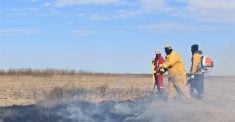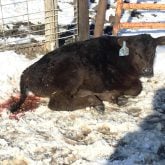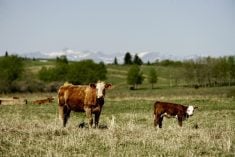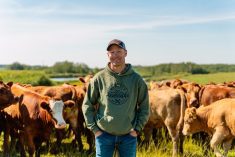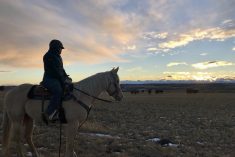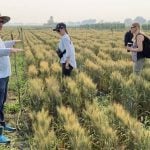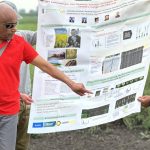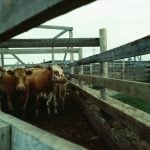The Agri-Trend Group of Companies is in the process of launching a new program for livestock producers under the umbrella of its Agri-Trend Agrology network. Founded in 1997 by Alberta native Rob Saik, Agri-Trend has evolved to encompass five companies: Agri-Trend Agrology, Agri-Trend Aggregation, Agri-Trend Marketing, Agri-Trend Data Corp. and Agri-Trend GEO Solutions. Headquartered at Red Deer, Alta., Agri-Trend has established a network of independent agri-coaches scattered from B.C. throughout the Prairies to Quebec and into the northern U.S.
“Agri-Trend Agrology has wanted to incorporate a livestock component for 10 years now as many of our growers — probably 60 per cent — manage both crops and critters,” says Agri-Trend Agrology president Elston Solberg. “If you apply science to all aspects you can have a complete view of the on-farm nutrient management cycles. Better decisions will be made in all aspects of the operation. That has been our thinking for a long time now. We just needed the right people and tools to come along.”
Read Also

Reintroducing fire to Saskatchewan pastures
Pastures evolve over time. Woody plants and shrubs, which cattle can’t eat, may encroach on natural grasses. Invasive species, such…
Enter Iain Stables. He was raised on a mixed farm in the Rosetown area that is now home to Canada’s third longest-standing purebred Black Angus herd. Stables worked on the family farm and in the ag business sector after completing his education at the University of Saskatchewan. He now has his own beef operation near Saskatoon.
As Agri-Trend’s first agri-coach for the Livestock Performance Program, Stables has been on the job since last June developing the program, identifying agri-coaches and rounding up clients to get the program up and running as quickly as possible in the new year.
Agri-coaches are specialists in their particular field who run their own independent businesses. They have the benefit of tapping into the knowledge of Agri-Trend’s accomplished senior agri-coaches, each of whom is widely recognized in his or her own field of expertise.
The Livestock Performance Program itself currently has seven components: feed crop and forage production; formulating feed rations; manure management; grazing management; animal performance; managing market risk; and branding beef with traceability. Agri-Trend Aggregation has been working closely with all agri-coaches in helping producers prepare for the carbon offset market.
For the most part, you can choose to hire a coach for any or all of the components, so the cost will vary from farm to farm and year to year depending on what each producer wants to do, Stables explains. It works the same as the crop agrology side with one-year contracts. At the end of the year, the agri-coach and producer review what has been accomplished and the producer has the option of signing on for another year.
Stables is impressed with Agri-Trend Agrology’s 97 per cent annual client retention rate which to him indicates producers are seeing the benefit of having a qualified agri-coach on their side. “People pay for the service — if they didn’t see a benefit, they wouldn’t be back,” he says. “Each coach is independent, so if the client doesn’t make money, the coach won’t make money.”
Agri-coaches have access to numerous tools to extract scientific and detailed information from your fields and livestock, along with the expertise to interpret it. The goal is to improve production efficiency and profitability, however, whether or not you use the advice and the specific products is totally up to you, Stables adds.
Livestock components
Agri-Trend Agrology’s new Livestock Performance Program draws on the company’s proven data management software (ADSPro) and strategic systems for crop production and manure management. They’ve also pulled some specialized livestock programs into the fold by forging agreements with Troy Drake of Cow/Calf Health Management Services at Kathryn, Alta., and Steve Kenyon of Greener Pastures Ranching at Busby, Alta.
Drake developed the TraceBack software program outlined in Canadian Cattlemen’s October, 2010 issue. Stables says a software program to collect and manage information on individual animals was the missing link in Agri-Trend’s ability to offer a complete livestock program. He learned about the program from his brother at Brooks who is one of nine veterinarians using the TraceBack program in the CCHMS network. Drake liked what he had seen of Agri-Trend’s work on the crop side and the company’s policy of working with independent agri-coaches. He also saw the opportunity to license TraceBack to Agri-Trend as a way to free up some of his time for his veterinary practice, yet still retain ownership and oversight of the TraceBack program.
Agri-coaches will be using Trace-Back to link performance and management details for individual animals with their radio frequency identification (RFID) numbers. The reports generated are designed to help producers make informed management and marketing decisions. In tandem with retained ownership of the calves, which enables clients to acquire feed efficiency and carcass data, producers will be able to identify their most profitable cows. The managing veterinarian or agri-coach can use the information to verify attributes such as age, source, process and handling, health record, movement on or off the farm, sales, parentage and to certify feed resources.
You must be enrolled in the Trace-Back program in order to sign on for Agri-Trend’s managing-market-risk component. Managing market risk involves retaining ownership of some or all of your calves through to the rail at the packing plant or beyond. Agri-Trend has an option offered through Drake for retained ownership when cash flow or footing the feed bills is problematic. Selling some calves in the fall for cash flow and retaining ownership of the rest to add value is another way to manage risk.
Canadian Cattlemen readers also know Steve Kenyon, whose custom grazing operation and consulting business was featured back in March of 2008. He has been a regular contributor to the magazine since May, 2009.
Since there weren’t enough hours in a day to wear another hat as an agricoach, Kenyon has made arrangements for Agri-Trend to use his pasture and grazing management program strategies and tools. Agri-coaches will work with producers to determine optimal stocking rates for their pasture to ensure that all of the grass is utilized without over-or undergrazing and without sacrificing performance.
Stables highlights the forage planner, which is a tool that allows producers to forward plan forage requirements if they want to expand or alter the herd size with additional cows, yearlings or retained ownership of their calves. It uses your own forage and animal production records to project the amount of additional feed you will need to match forage resources to your growth plan over any specified period of time.
The Strategic Crop Plan is a trademarked Agri-Trend program that helps producers balance the push on feed grains, silage and forage yields with lowering the cost of production by allocating resources where they will be the most effective. Agri-Trend’s philosophy is that everything starts with a soil sample, Stables explains. This is followed with livestock production as well since the soil sample provides the information to grow the feed with the nutritional quality needed to economically raise quality beef.
The Manure Management Process is another trademarked Agri-Trend program that has been in use on the crop side for a long time now. It comes up with a strategic plan to store and apply manure within a balanced soil nutrient program to improve yields, reduce fertilizer costs and improve organic matter.
Agri-Trend has its own formula to determine the release rate of nitrogen, phosphorus and other nutrients from the manure in each year following application, says Stables. The numbers can be plugged into a calculator to show the value of the manure relative to current commercial fertilizer prices that can be used to negotiate a selling price if you choose to market the manure. An important part of the agricoaches’ service is helping producers decipher federal and provincial regulations regarding the sale of manure.
A coach will sample the feed for testing, go over the results with you and work up cost-effective rations. They take the same approach with soil tests and manure tests.
Stables feels consumers’ newfound interest in food represents a real growth opportunity for beef producers. By combining RFID technology and Agri-Trend’s software programs, producers will be able to produce a completely traceable product from field to fork.
The information can be imbedded in a quick response (QR) bar code.
With today’s technology, consumers can use their smartphones to scan the QR code on the label, from a menu or from an advertisement to instantly see all of the information related to the animal — from where and when it was born, raised and harvested, to health treatments and production protocols, right down to the rations it was fed through each growth stage, and the inputs used to produce the feed. Consumers can even use Google Earth to look at the locations where the animal was raised.
For more information about the new Livestock Performance Program, contact Stables tollfree at 1-877-276-7526, or email [email protected].
———
The goal is to improve production efficiency and profitability, however, whether or not you use the advice and the specific products is totally up to you



